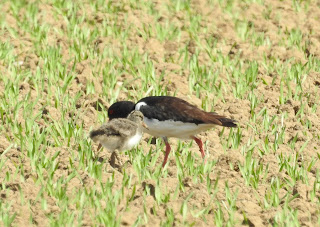Blue Water-speedwell
(Veronica anagallis-aquatica)
My photos of this surprised the botanists online as the large stems had adventitious roots growing from them. I guess it was in response to the ditch being almost completely dry. A few days of rain and they were no longer needed.
Thought this was a sedge at first but eventually identified it as ...
Wild Onion
(Allium vineale)
It has lots of other common names e.g. Crow Garlic
This long blog post just shows a tiny sample of the wildlife that can be seen in the Druridge Bay area. The problem is it may take hours of scouring through websites and field guides before you identify some of the things you find.
Oystercatcher (with young)
Narrow-bordered Five-spot Burnet
A huge movement of Crossbills and Siskins took place last week. I am guessing they had a very good reproductive success and these were mostly juveniles dispersing.
Thought this was Tree Wasp but unfortunately I was informed that there was not enough detail on my photos to confirm ID. Hey Ho!
Silver-Y
Pimpla rufipes
This is one I had success with. My ID was confirmed by the experts.
Yellow Dung Fly
(Scathophaga stercoraria)
Tawny Owl
Speckled Wood
Sawfly sp?
(Tenthredo sp?)
I think either arcuata or brevicornis?
Celypha lacunana
I tentatively identified this as Orthotaenia undulana, my field guide suggested Celypha as a confusion species but I couldn't see the key feature. Thankfully TT (@sibechat) corrected me. On looking back I found the key feature by flipping my image so it was facing the same way as the field guide illustration. A tip I must remember in future.
Volucella bombylans
Cheilosia illustrata
One of the four Marsh Harrier juveniles having a brief flight around the nest area.
Grasshopper Warbler
Several singing again after a quiet period. Perhaps an indication they are second-brooding. Nine pairs of Stonechats bred along a two mile stretch of the bay. They fledged twenty two young. Most have dispersed but many of the adults have been seen this week carrying food to the nest (again on their second broods).
Common Bluetail
Spoonbills
Small Skipper
Brown Hare
Weasel, Stoat, Rabbit and Roe Deer also seen in the bay. Roe Deer at Druridge have 2 fawns and the Chevington pair have 1 fawn.
Diamond-back Moth
(Plutella xylostella)
Fairy Flax
These flowers are tiny and the illustrations in the Collins Field Guide are really poor. It took a bit of time before I identified it.
This is a Click Beetle. Unfortunately I failed to identify it.
Finally this morning. Grey and wet was brightened by this Cuckoo being mobbed by Meadow Pipits while catching and eating a number of Drinker Moth Caterpillars.
Druridge Bay, what a great place to live ... if only ...

























































